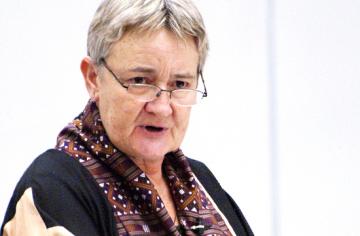“Well-being is not an economic term”
- Lisa Pasolli

Human rights activist, lecturer and author Dr. Marilyn Waring visited campus in mid April at the invitation of UVic’s Centre for Co-operative and Community-Based Economy (CCCBE). Having served throughout her life as a politician, an internationally respected academic and consultant, and a passionate activist for women and the environment, Waring is uniquely positioned to offer insight into the making of public policy. On April 14, she shared reflections on her career with an audience of students, faculty and community members who filled the Bob Wright Centre auditorium to capacity for her public lecture “What Does Progress Mean for our Society and our Communities?”
Waring, currently a professor of public policy at the Auckland University of Technology in New Zealand, was elected at age 23 to the New Zealand Parliament. She served as a politician for nine years (1975–84) before moving into academia. The 1988 publication of her book If Women Counted marked Waring as a leading international voice for a feminist perspective of economics. In it, she called for a radical rethinking of systems of national income accounting to take into consideration women’s unpaid work.
Along with issues of gender equality, a commitment to environmentalism has run throughout Waring’s career. In her UVic lecture, she took the opportunity to look back on her environmental campaigns with a critical eye. Waring admitted to having second thoughts about some of the arguments she advocated as a young politician and activist. “When I was desperate to save something, whether a river, an ecosystem, a forest,” she related, “the way in which I could empower [it] was to give it a monetary value, to quantify it, to make it a commodity.”
But these days, Waring approaches these economic models with skepticism. She urged the audience to be wary of the “contagious illusion that everything can be reduced to a price.”
Using solely economic terms to measure environmental factors, Waring warned, often misrepresents the reality of the situation. She pointed to the Exxon-Valdez oil spill, for example, for which the cleanup and recovery efforts were actually economic generators. In this sense, economic measurements such as the Gross Domestic Product (GDP) and Gross National Product (GNP) fail to take into account the declining health and quality of life of communities, individuals and the environment.
“Well-being is not an economic term,” Waring stresses.
Waring does not completely discount the utility of economics to account for the value of environmental resources. She spoke highly of Nova Scotian efforts, for example, to assign dollar values to the destruction of wetlands and ecosystems, which played a powerful role in highlighting just how significant those losses were to the province. Waring cautioned, however, of the “colonizing power of economics.” While economics certainly has its utility, she argued, it must be part of a multidimensional approach to measuring well-being.
Waring, however, is not content to simply sit back and criticize. Along with her internationally respected work as a consultant for the United Nations Development Fund for Women, the Food and Agriculture Organization of the UN and the Ford Foundation, she is also a Founding Board Member of the Canadian Index of Wellbeing, which seeks to provide a holistic way to measure and improve quality of life [see www.ciw.ca].
Podcast of Waring’s April 14 lecture
Lisa Pasolli is a PhD candidate in the UVic Department of History

